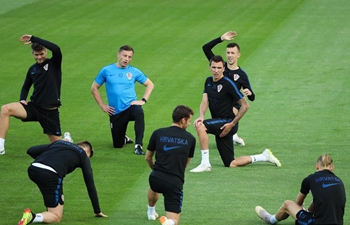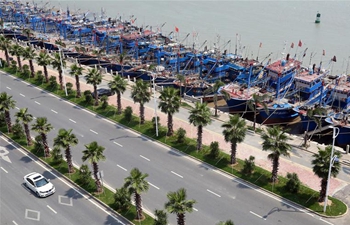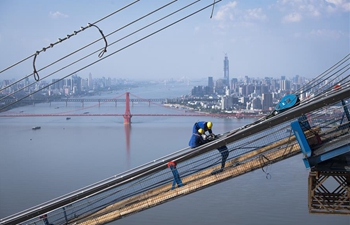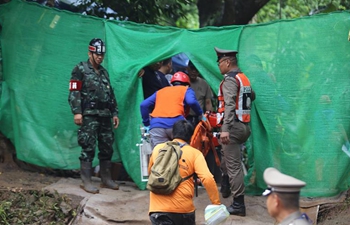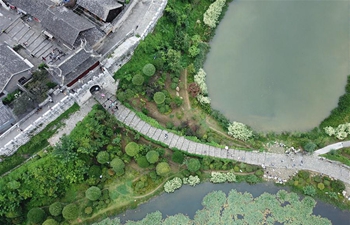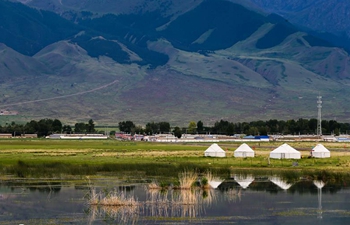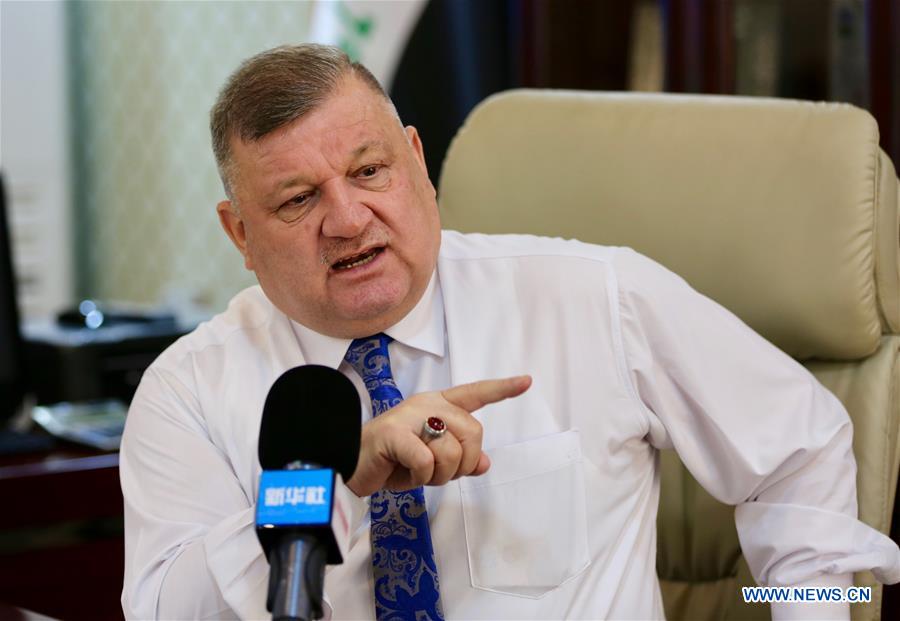
Mosul Mayor Zuhair Muhsin al-Araji receives an exclusive interview with Xinhua in Mosul, Iraq, July 8, 2018. Zuhair Muhsin al-Araji said in an exclusive interview with Xinhua that reconstruction process of Mosul has not start yet, and the compensation plan for the destroyed houses has not launched. TO GO WITH Feature: Iraq's Mosul far from rehabilitation 1 year after liberation from IS (Xinhua/Khalil Dawood)
MOSUL, Iraq, July 9 (Xinhua) -- One year after liberation from the Islamic State (IS), Iraq's second largest city of Mosul still lies in ruins far from rehabilitation. Smell of rotting bodies comes from under the rubbles, and residents were struggling to rebuild their life.
In the old city center of the west side of Mosul, which witnessed one of the fiercest battles since World War II, some residents have family members buried under the rubble, but unable to move them.
Many people expressed their willingness to do anything that may help regaining their normal life, despite the lack of money and equipment until the world and the Iraqi government would launch the long-awaited campaigns of reconstruction.
At the badly devastated al-Shahwan neighborhood in the old city center, where only demolished walls riddled with bullets could be seen, a rare view appeared amid piles of rubble as a group of construction workers were building brick walls of the house of Ali Saadi.
Saadi's house was destroyed in 2017 during a rocket barrage on the neighborhood. His family survived the bombing, but during their escape, his 16-year-old daughter was hit by a bullet from a fierce fire exchange between the government security forces and the extremist militants.
She was bedridden till today.
Saadi was also wounded when he and his family escaped their bombed house.
"I would rather die in my house than facing the tragedy of my daughter and the loss of everything in my life," Saadi said.
However, Saadi was lucky when someone phoned him saying that a donor, who refused to identify himself, pledged to pay the construction cost of his house.
"With the support of this unidentified person, I have finally been able to rebuild my house, which is the first in this neighborhood, and I hope more house to be built to give hope to other displaced neighbors," Saadi said.
In a coffee shop, where many workers used to gather after a hard day of cleaning up ruins of devastated buildings, blames were heard for the Baghdad government's neglecting the city.
A young man smoking a traditional water pipe, or Shisha as Iraqis name it, said he heard media reports on funds allocated by the Baghdad government to rebuild Mosul, but "actually we haven't seen any progress by this money. I wonder was it true or stolen by corrupt officials?"
"Dozens of thousands of people cannot come back to their homes, because they don't have money to rebuild their houses, not to mention the lack of basic public services in their neighborhoods," the young man said while he was inhaling deeply from the mouthpiece of the Shisha and exhaling a jet of white smoke.
"Can you imagine the misery of the people here, they even using water wells while the world is watching us?" the young man said, blaming the situation on corruption and failure of Iraqi politicians.
Meanwhile, Mosul Mayor Zuhair Muhsin al-Araji said in an exclusive interview with Xinhua that reconstruction process has not start yet, and the compensation plan for the destroyed houses has not launched.
Mosul, located about 400 km north of the capital Baghdad, was seized by the extremist IS militant group in June 2014.
On July 10, 2017, the Iraqi government army recovered the heavily populated city after nearly nine months of fierce fighting and heavy bombardment.
"Mosul needs billions of dollars for reconstruction because the devastation ranged from 10 percent in some areas to 100 percent like in the old city center, where some 11,500 buildings were destroyed," Araji said.
The fierce clashes destroyed the city's power stations, as well as infrastructure including roads, bridges, water supply, hospitals and schools, he added.
"Mosul has been forgotten by international community and central government in Baghdad. We, as local officials and citizens of Mosul, are frustrated by this negligence, which leads to insufficient support for Mosul," Araji said.
"The reconstruction efforts and aid plans coming from the central government have been few and far between," Araji said.
Before the fall of Mosul to the IS group, the city's municipal government had more than 2,500 vehicles including forklifts, garbage trucks and others operated by 11,000 temporary employees. Now there are only 300 vehicles working day and night with only 3,000 workers, some of whom only earn 4,000 dinars (3.34 U.S. dollars) a day, according to Araji.
He added that most bridges, which connect the two halves of the city, are only temporally fixed, with only one bridge, the Iron Bridge, has been properly repaired.
Commercial life will not return to the marketplace without reliable bridges and roads, he said.
He also praised UNESCO and the United Arab Emirates (UAE) for helping rebuild the historical Grand al-Nuri Mosque.
In April, Iraq, UAE and UNESCO signed an agreement of partnership to exploit 50.4 million dollars offered by UAE to rebuild the mosque, which IS militants blew up on June 21, 2017, as Iraqi forces were pushing near the mosque area in the western side of Mosul.
Al-Nuri Mosque was built in A.D. 1172 with its famous leaning minaret, which gave the city its nickname "al-Hadbaa" or "the hunchback."
The mosque has a symbolic value, as it was the place where IS leader Abu Bakr al-Baghdadi declared the cross-border "caliphate" in Iraq and Syria in his sole public appearance in July 2014.
Araji complained that the country's 2018 annual budget allocated 180 billion Iraqi Dinars (about 150 million dollars), but Mosul has not received the money until now.
Currently, the funds needed for reconstruction can only rely on charitable donations and borrowing to maintain the essential operations, according to Araji.
"If the reconstruction efforts continue in this low level, the city will not be rebuilt in the near future," Araji warned.
"But if the awaited government that would be formed in Baghdad changed its attitude toward Mosul, and if the world and international organizations pay attention to the catastrophic situation in Mosul, then we have a complete reconstruction plan to build Mosul as it was and even better within less than a year," Araji said.
A large part of Iraq's northern province of Nineveh, including its capital Mosul, came under IS control since June 2014, when government forces abandoned their weapons and fled, enabling IS militants to take control of parts of Iraq's northern and western regions.
On July 10, 2017, Iraqi Prime Minister Haider al-Abadi formally declared Mosul's liberation from IS after nearly nine months of fierce fighting to dislodge the extremist militants from their last major stronghold in Iraq.




